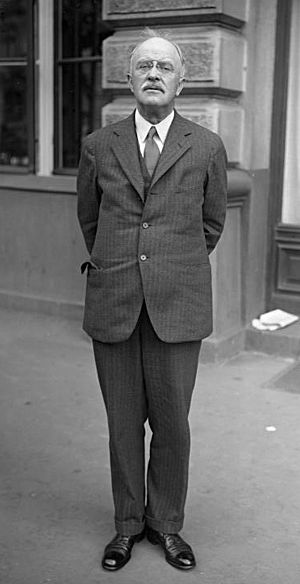Oswald Garrison Villard facts for kids
Oswald Garrison Villard (born March 13, 1872 – died October 1, 1949) was an important American journalist and newspaper editor. He was known for his strong beliefs and for fighting for what he thought was right. Villard was a big supporter of civil rights for all people. He also helped start the NAACP, an organization that works for equal rights for African Americans. He often spoke out against war and against America taking over other countries.
Contents
Early Life and Start in Journalism
Oswald Garrison Villard was born in Wiesbaden, Germany, on March 13, 1872. His parents were living there at the time. His father, Henry Villard, was an American newspaper writer who had moved from Germany. His mother, Fanny Garrison Villard, was the daughter of William Lloyd Garrison, a famous person who worked to end slavery. Fanny Villard also fought for women's right to vote and for peace.
In 1881, Oswald's father bought two important newspapers: The Nation and the New York Evening Post. The family moved back to the United States and settled in New York City in 1876.
Villard went to Harvard University and graduated in 1893. He then studied American history and could have become a teacher. But he wanted a more active life. In 1896, he joined his father's newspaper, the Evening Post. He started writing regularly for both the New York Evening Post and The Nation. He believed in being honest and fair in journalism.
Fighting for Rights and Justice
Villard was a strong activist for many causes. He helped create the American Anti-Imperialist League. This group believed that territories taken by the U.S. in the Spanish–American War should become independent. Villard used his newspaper to speak out against America expanding its power over other countries.
In 1910, Villard offered space in the New York Evening Post for a special announcement. This announcement led to the official start of the National Association for the Advancement of Colored People (NAACP). Villard became a co-founder of the NAACP, working with people like W. E. B. Du Bois. For many years, Villard helped manage the NAACP's money.
Villard supported Woodrow Wilson in the 1912 election for president. He even talked with Wilson about improving conditions for African Americans. However, in 1913, Villard was very upset when Wilson's government started separating black and white workers in federal offices in Washington, D.C. This was a change from how things used to be. Villard wrote to President Wilson to protest this. But Wilson did not change his policies. Because of this, Villard stopped supporting Wilson and wrote against him in his newspapers.
Villard also disagreed with Wilson's plan for the League of Nations, an international organization for peace. In 1921, a crowd tried to stop him from giving a speech against the League in Cincinnati, Ohio.
His Books and Writings
Oswald Garrison Villard wrote several important books. In 1910, he published a book called John Brown 1800-1859: A Biography Fifty Years After. This book showed John Brown, who fought against slavery, as an inspiring American hero. People praised the book for being fair and using new information.
Villard also wrote books about Germany, where he was born. In Germany Embattled (1915), he asked readers to remember Germany's good contributions to American life. He also wrote about the political situation in Germany. He believed the U.S. should stay neutral in the European conflict at that time. He wrote two more books about Germany, including one that discussed Adolf Hitler's harsh Nazi policies and the struggles of German citizens.
Villard wrote many books that looked closely at journalists and newspapers. He wanted to make journalism better. He felt that some journalists were not being honest because they were too influenced by businesses and politicians. He also published many articles and speeches on different topics, such as war, music, his family, and unfair treatment based on race. He also wrote a book about his father's early life and achievements. His autobiography, Fighting Years: Memoirs of a Liberal Editor, was also very popular.
Changing Views and Later Life
After World War I, Villard continued to support civil liberties, civil rights, and anti-imperialism. However, his economic views changed. In the 1930s, he supported the New Deal, which were government programs to help the country during the Great Depression. He even called for major industries to be controlled by the government.
Villard was always an independent thinker. In the late 1930s, he strongly disagreed with President Franklin D. Roosevelt's foreign policy. He was an early member of the America First Committee, a group that did not want the U.S. to enter World War II. He used his newspaper, The Nation, to share his opinions.
He eventually stopped working with The Nation because it supported America joining the war. He also became worried about the growing power of the government under the New Deal. He believed it could lead to a type of fascism in America. He was also very sad about the bombing raids carried out by the Allies during World War II.
After 1945, Villard joined with "old right" conservatives who were against the Cold War policies of President Harry S. Truman.
Villard had a heart attack in 1944 and a stroke five years later. He passed away on October 1, 1949, in New York City.
Family and Legacy
Oswald Garrison Villard's oldest son, Henry Hilgard Villard, became the head of the economics department at the City College of New York. His youngest son, Oswald Garrison Villard, Jr., was a professor of electrical engineering at Stanford University. His daughter, Dorothy Villard Hammond, was involved with the American University in Cairo.
On February 21, 2009, the U.S. Postal Service released a special stamp to honor Villard's important work for civil rights.
See also
 In Spanish: Oswald Garrison Villard para niños
In Spanish: Oswald Garrison Villard para niños
 | Jessica Watkins |
 | Robert Henry Lawrence Jr. |
 | Mae Jemison |
 | Sian Proctor |
 | Guion Bluford |


